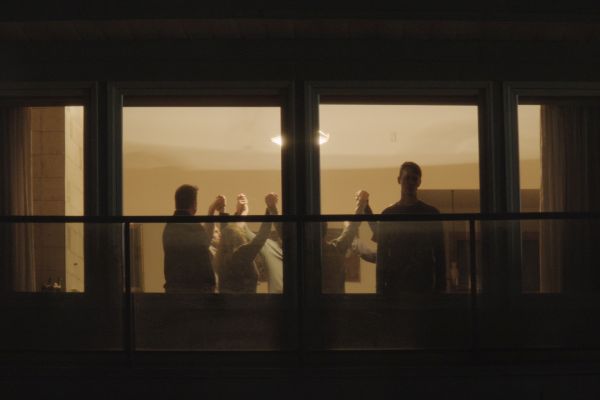Nope, this isn’t the Spiral that is the next instalment of the Saw franchise. That film is one of many anticipated genre titles that have been indefinitely delayed once again after Christopher Nolan apparently failed to save cinema. This Spiral is Shudder’s latest acquisition, an LGBTQ+ folk horror that was something of an audience darling at FrightFest last year, back in those halcyon days when viewers could attend film festivals in person. With a finely-tuned central performance from Jeffrey Bowyer-Chapman, and the queer spin proving a central point of the narrative instead of simply a handy marketing ploy, it is easy to see why.
In 1995, Malik (Bowyer-Chapman) and his husband Aaron (Ari Cohen) move from Chicago to the small town of Rusty Creek, with Aaron’s teenage daughter Kayla (Jennifer Laporte) in tow. Aaron is charmed by the warm, open-minded welcome with which he believes they’ve been received. Malik, despite his outward flamboyance, is wary – especially as he still suffers PTSD from a horrendous homophobic attack as a teenager. He paints over a hateful message daubed on their walls and begins to keep a log of the odd occurrences until it drives him towards paranoia and madness.
Spiral has been labelled (somewhat reductively) as the gay Get Out, and there are undoubted similarities in terms of sinister motivations lurking beneath seemingly liberal values. Despite the specificity of Malik and Aaron targeted as a same-sex couple, the sense of pervasive dread and the recurrence of esoteric symbols pulls the film into the same murky, unsettling waters as Ben Wheatley‘s Kill List. As well as sinister figures in hoods, there’s also the unravelling of the domestic unit exacerbated by financial pressures; a mundanity that stands in stark relief against the horror. It is when the film tries to break away from its deep socio-political foundations into the overtly supernatural realm that cracks appear. It’s as if director Harer and writers Colin Minihan and John Poliquin were not confident with the slow-burn horror so threw in some jump scares. They add nothing beside bafflement at the odd decision-making.
Shining through any narrative wobbles is Jeffrey Bowyer-Chapman. Malik is easily the most rounded character, and the actor calibrates his portrayal accordingly to startling effect. He captures the outward confidence and the inner turmoil of Malik, and the degrees in between as the exuberant veneer chips away and his confusion and pain begins to churn more violently. He also has a sweet, protective and faux-combative relationship with Kayla, who obviously adores him. The filmmakers make the wise decision to filter most of the events through his unreliable eyes – temporal shifts and all – which adds at least a patina of ambiguity to the events. This makes it odd that the central reveal occurs with Aaron present and Malik absent. It makes narrative sense but feels like a slight flaw in the writing that the central protagonist is missing for the crescendo.
It’s possible to take a weirdly conservative reading from Spiral – one voiced by Malik himself to Kayla: “Do not draw attention to yourself. Do not speak up. Do not speak out.” It rather suggests that if the couple had not been so open, they would not have been targeted. It’s implied, especially as the mystery is slowly revealed, that it may be their visibility that makes them vulnerable. It is of course entirely likely that the residents of the town would have worked out their relationship even if they had kept their heads down, or that their status as an interracial couple would have proved enough to paint them as victims.
The title suggests – and the story confirms – that society will always attack those it perceives as ‘other’, for whatever reason – race, class, sexuality. The setting of 1995 isn’t just to illustrate a more obviously homophobic time but to illustrate how little has changed a quarter of a century down the line. “People don’t change,” Malik says. “They just get better at hiding how they feel.” It’s a bleakly ironic statement given the toxic reemergence of open bigotry into the mainstream. It would be curious for a film that makes a plea for tolerance to hint that there is safety in conformity, but that is the disconnect that occurs when progressive politics rub against the historical small ‘c’ conservatism of the genre. It is a conundrum that Harer does not quite reckon with, but Spiral is otherwise an impressive and well-made take on folk horror. It tempers its plaintive bleakness with a hopeful coda, and has a dynamite central performance that is up there with the best horror has had to offer in recent years.
Available to stream on Shudder from Thu 17 Sep 2020
